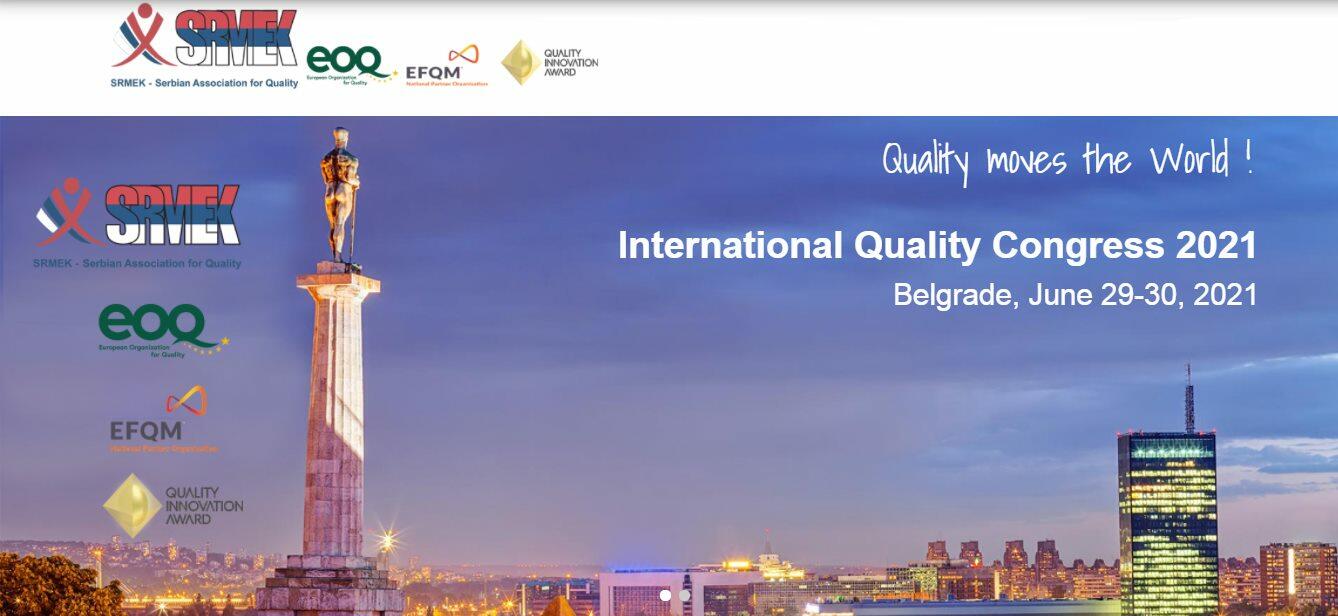
Quality Education - European Quality Congress
Vincent Desmond, CEO at the CQI, discusses the highlights from this year’s European quality conference delivered by the Serbian Association for Quality.
Like the 2020 Olympics and Euro 2020, the European Organisation for Quality’s EOQ 2020 Congress was postponed due to the pandemic. However, it went ahead in June 2021 as a virtual two-day congress hosted by the Serbian Association for Quality, SRMEK.
The quality community needs a strategic approach to education
Although the core theme of the conference was Quality Management Education, there were more questions than answers. Recent EOQ supported research revealed that higher education (HE) institutions in Europe don’t offer many quality management programmes, but the research did not establish if this was a problem. And we, the delegates, were not able to reflect and discuss the topic. This is one of the limitations of a one-way broadcast conference.
Certainly, we have seen a reduction in quality management HE programmes in the UK over the past few decades. I suspect that any discussion would have flushed out a common concern that the quality community doesn’t have an adequate HE offer to feed the profession or, importantly, to educate its non-quality professional stakeholders. John Dew (USA), former Training Manager at Lockheed Martin, did give us a compelling industry view on the non-quality professional education point. He explained that Lockheed’s quality education programme focuses on the very different approach needed for frontline workers, supervisors and senior leaders.
I know industry would like people to come into the business with a good level of understanding of quality principles and methods. Indeed, Dr. Kazuyuki Suzuki (Japan) outlined how JSQC has been supporting education in problem-solving and statistical tools in primary and higher schools since 2010 (including, believe it or not, a ‘cuteness’ analysis tool). Apparently, in 2023 this will be expanded in Japan to include teacher training ‘cross-curricular problem-solving’.

Sustainability and technology: key driving forces for the profession
A number of papers spoke about what are now macro trends impacting the quality management science and practitioners: the so-called Quality 4.0 and sustainability agendas. The Quality 4.0 topic got little direct airtime, which is perhaps not a surprise as there was a lot on this topic at the last EOQ congress, but a large proportion of speakers referenced the topic.
Sustainable Quality
The debate on the synergy between quality management and sustainability has been bubbling around the profession’s agenda since about 2010, with, for example, the ASQ tackling it with BSR back in 2011 and Gregory H. Watson in his 2015 paper on Sustainable Quality.
Fast forward to 2021 (the CQI’s World Quality Week theme for 2021 is sustainability), and we still appear to be working on theory rather than practice. A couple of papers built on the ‘little q’ / ‘big Q’ idea, pushing for a new ‘enormously huge Q’ which embraces people and planet considerations into the quality of product, service and process.
Many speakers were inspiringly passionate about the quality profession being able to, and needing to, make a difference in the sustainability arena. The always compelling Narayanan Ramanathan (India) raised a grand challenge for the quality profession: the need to apply quality management to address global issues facing society and planet earth.
Anxious to move from theory to practice, the International Academy for Quality covered their recently introduced quality/sustainability award which identifies real-life projects that have used quality principles and methods to improve value and reduce environmental or social impact.
Grasping for agility
The agility topic has also been floating around the edges for some time with a concern about how we square the principles of standardisation and repeatability with the needs of the flat, agile, fast super-organisations - that we’re told are coming in the near future. As one speaker put it, ‘Bureaucratic systems will not be tolerated by customers or employees’. I have seen little more on this topic other than people saying that ‘We must be more agile!’, but this conference featured an interesting research paper on ISO 9001 and Agility commissioned by German quality association, DGQ.
The first and rather pertinent finding was that no-one could agree on a definition for ‘agile working’, (although the UK’s Business Agility Consortium may want to disagree). However, some interesting ideas emerged.
- Agility requires empowered, self-managing teams (quality circles on steroids) and agile practices (iterative work packages, Kanban boards etc)
- Agile is best applied to ‘messy’ contexts. One example case was provided relating to a manufacturing organisation creating multi-functional teams to progress orders from end-to-end rather than handing off from team to team
Agile? Maybe. The conclusion was that ISO 9001 is, at least, not a constraint to agility. We need to do more work on this, but it is worth the time.
Not the new normal
Content aside, my overall observation is that digital conferences will not be the new normal because discussion and challenge, which we need to move the debate along, are simply missing. And as a delegate, it’s too easy to be side-tracked by emails and phone calls rather than being really present for the speakers and topics.
That said, there is a real case for hybrid events which can be more inclusive and, of course, more environmentally friendly. It was great to hear that SRMEK gave students globally access to their content for free. We should take those benefits seriously if we’re going to walk the talk on inclusion and sustainability.
Recognising that I’m about to contradict myself on the environment topic, conferences are always an opportunity to promote tourism and Serbia missed out on that because of Covid-19. So, I think you should watch their See Serbia video as you all plan your post-pandemic holidays.
And finally, plaudits to SRMEK President Dr. Jovo Lojanica CQP FCQI and his team for shifting this event online so smoothly. Hvala!
CQI 2022 International Quality Awards
The CQI’s next International Quality Awards will take place on 23 June 2022 as part of a global conference.
